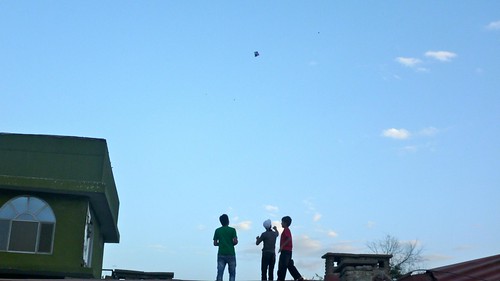After a month of frequent hello’s and short conversations, my Afghan friend AJ offerred to accompany me to any place I wanted to see in Kabul before it was time for me to leave the country. The offer alone was flattering, knowing how often foreigners pass through this country doing short-term jobs and then moving on, I was honored AJ would spend time with me to see things he had probably seen a million times. I told him I had read about the Bagh-e-Babur Gardens and that I would really like to see them. Without giving me the least bit of a “that’s boring” reaction, AJ started planning the when and how.
A few days later we were in a taxi and speeding off to the Babur Gardens, built in 1528AD by the Moghul emporer Babur. The whole cab ride AJ flipped through some wrinkled pages with Dari writing on them, I soon realized he had printed out background information for our journey. As any journey across Kabul requires, we were met with plentiful traffic which gave us more time to discuss education in Afghanistan and the United States, as well as asking the cab driver about his age and his upcoming marriage. Crossing over the almost dry Kabul River, the gardens came into view, perched on the mountainside behind large walls that very successfully hide the splendor within.
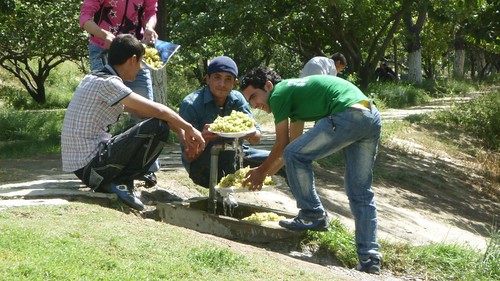
After a brief discussion about how terrible it is that foreigners must pay money for accessing public gardens, we made our way passed the guards, passed the walls, and into the green. Suddenly the world turns peaceful, the air turns clean, and the stone faces on the street give way to smiles. As we walk up the tree lined path, I notice beautiful roses and an array of flowers to our right. Beneath the trees to our left there are people, men, women, friends, couples, sprawled out and relaxing just a few hours before lunch. Some are speaking quietly to each other, others in large groups seem to be telling stories and having a good laugh, still others aren’t talking at all, just enjoying the tranquility.
A ten to fifteen minute walk up the path and we’ve reached a group of buildings. “This one is a ceremonial hall, that back there is a mosque, and up there is the tomb of Babur,” AJ explained to me enthusiastically, as we walked from one to the other. Upon arrival at the tomb we’re greeted by an old man with an ID badge on his arm, he welcomes us after waving goodbye to the previous visitors. What follows is a 4 minute, well memorized account of who is buried here, when they were buried, and what is written on the tombstone. I would love to share with you what he said, but it all happened so quickly, all I know is that it sounded fantastic. “Please sign the book”, he motions towards a series of books where tourists leave little messages. I decide out of all the languages and identities that might already be in the book, it could use a Portuguese text, so I go to work on a nice message from Mark from Lisbon.
For several more hours AJ guided me past a palace, by the greenhouse, and towards a few works of art hidden between the trees and walkways. Throughout this time we discuss the complexities of life in Afghanistan, from work to school, love to family, religion to tribes, it is one big final lesson in things I have been learning about all month. These discussions are interrupted frequently as I stop to snap a picture or record a video, each time AJ would wait patiently for me, before carrying on where we left off.
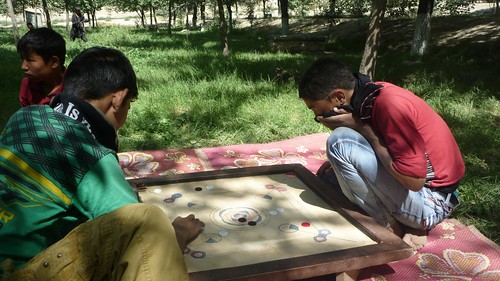
Towards the end of our visit we spotted an open childrens’ game involving sliding plastic circles over a wooden board, a quick explanation and we found ourselves wrapped up in several games for some time. The snack stand guy near us walked over from his responsibilities to watch us play. He tried his best in Dari to coach me to victory, but in the end the foreigner could not master this unfamiliar game and AJ took the match. As we said goodbye to the man, I shook his hand and snapped one more picture of the board. Again AJ waited for me to take all the pictures I felt I needed to take, then he turned to me and said, “Thank you for coming here and taking these pictures. Thank you for sharing such moments with your friends so that they know that in Afghanistan it is not just war and bad things.” His words echoed in my head as we enjoyed one last fresh apple juice and walked back through the front gate and into a taxi. I scanned the sad looking Kabul River for traces of water, and thought about all the beautiful things and people I have encountered, and how they have forever changed what I think of this magical country.
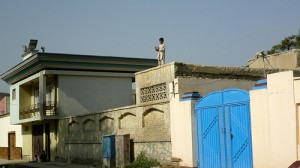
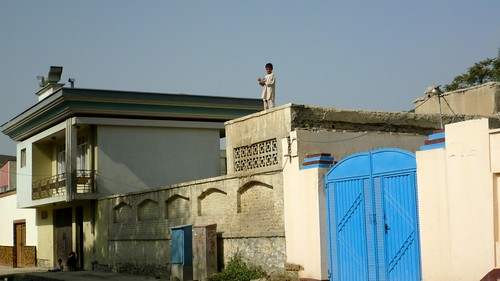
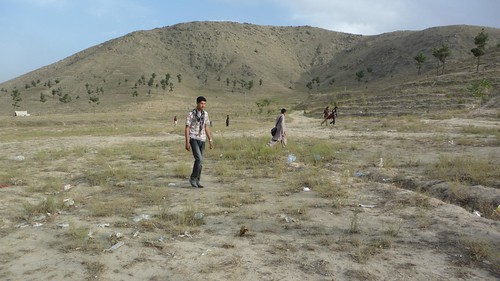
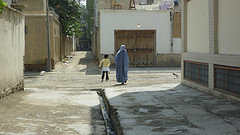
 On the eve of Eid a large group of friends made their way to an oasis outside Kabul to have a relaxing dinner. Sure enough I brought my recorder and before you know it, we got into discussions about the importance of the holiday and eventually, the history of homosexuality in Afghanistan. This recording was made during the course of our dinner and as such drifts off and is interrupted occasionally. Both topics could surely be developed further, but at the very least, this podcast might provide a good introduction.
On the eve of Eid a large group of friends made their way to an oasis outside Kabul to have a relaxing dinner. Sure enough I brought my recorder and before you know it, we got into discussions about the importance of the holiday and eventually, the history of homosexuality in Afghanistan. This recording was made during the course of our dinner and as such drifts off and is interrupted occasionally. Both topics could surely be developed further, but at the very least, this podcast might provide a good introduction.